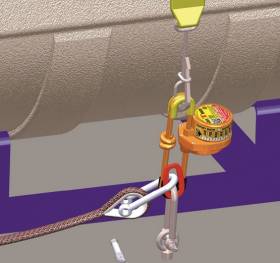Displaying items by tag: Product Recall
Safety Recall Notice for AWG Fire Hose Nozzles
The Department of Transport has been made aware of a Safety Recall Notice for AWG fire hose nozzles by the EU Commission’s Safety Gate rapid alert system.
The affected nozzles are type HS 10, HS 12, HS 16 and HS 20, country of origin Germany, marked with batch number “EN15182-1/3 2015” on the nozzle cap and “55” marked inside the orange tube.
They were most likely supplied during weeks 24 to 37 in
2015.
According to the EU notice, the product is defective and does not comply with the requirements of the Marine Equipment Directive or with the European Standard EN 15182- 1.
The notice adds that the nozzle is not robust enough to withstand working pressure of 16 bar and may burst. As a result, the user may be injured due to bursting or suffer burns when extinguishing a fire.
For more details on the safety recall, see Marine Notice No 81 of 2023 attached below.
Product Safety Recall Notice for Paroc Deck and Bulkhead Insulation
The Department of Transport advises that the manufacturer Paroc Group Oy, a subsidiary of Owens Corning, has issued a product safety recall for certain forms of deck and bulkhead insulation that it produces.
This recall follows independent testing where it was found that the products failed to meet the requirements for the respective Marine Equipment Directive 2014/90/EU (MED) fire integrity tests.
It is understood that the supply of these products in newbuild ships in Ireland has been limited but it is possible that it may have been installed by third-party suppliers for repair and modification purposes.
If you have non-installed stock of Paroc Marine’s Navis Mat, Navis Slab and Navis Wired Mat insulation products, as detailed in Marine Notice No 72 of 2023 attached below, please inform Paroc as soon as possible.
If any such product is installed on board a vessel, the supplier should be contacted and a remedial action plan agreed with the Marine Survey Office as a matter of urgency.
Any queries in relation to this Marine Notice should be addressed to [email protected].
UK Safety Office Issues Recall Notice for Popular Lifejacket
The UK’s Office for Product Safety & Standards have announced the recall of a popular lifejacket over safety concerns.
The product, which was sold via Amazon as Life Jacket 150N, has been identified as presenting a serious risk of drowning to the user if relied upon as protection in the water.
Amazon has since removed the product listing from its online marketplace and the OPSS is requiring the recall of the product from end users.
Owners of the above product are advised to visit the Product Safety Alerts, Reports and Recalls page on the GOV.UK website for further information and next steps.
The UK’s Office for Product Safety and Standards has announced a product recall for 11 models of lifejackets sold via online retailer Amazon over safety concerns.
Officials confirm that the affected products were not supplied with the required compliance documentation or markings to demonstrate that they have been adequately conformity assessed.
The models of lifejackets purchased by users via Amazon are those with the following brand names: NILIPEI, FLOATTOP, LIXONG, ROSOAMY, GRELANT, AJING, ZENING, STECTO, OMOUBOI, WELLPATH and Rrtizan.
The products do not meet the requirements of the PPE Regulation 2016/425 and as such, the Office for Product Safety and Standard recommend that owners stop using these products immediately. Owners are also recommended to contact the distributor to request redress.
For further information and product details, visit the GOV.UK website.
Recall Notice For Safetmade Hydrostatic Release Units
#Recall - The UK's Maritime and Coastguard Agency (MCA) has issued a recall notice for certain models of Safetmade hydrostatic release units (HRUs).
While these HRUs have been approved as having a service life of three years, investigations have shown that some units suffered water ingress, causing corrosion leading to their malfunction under normal conditions.
The affected models are the Safetmade LR-1 and EP-1, and owners are advised to return any such units to their nearest service station or port where they can be exchanged for an equivalent HRU up till 1 September 2016.





























































